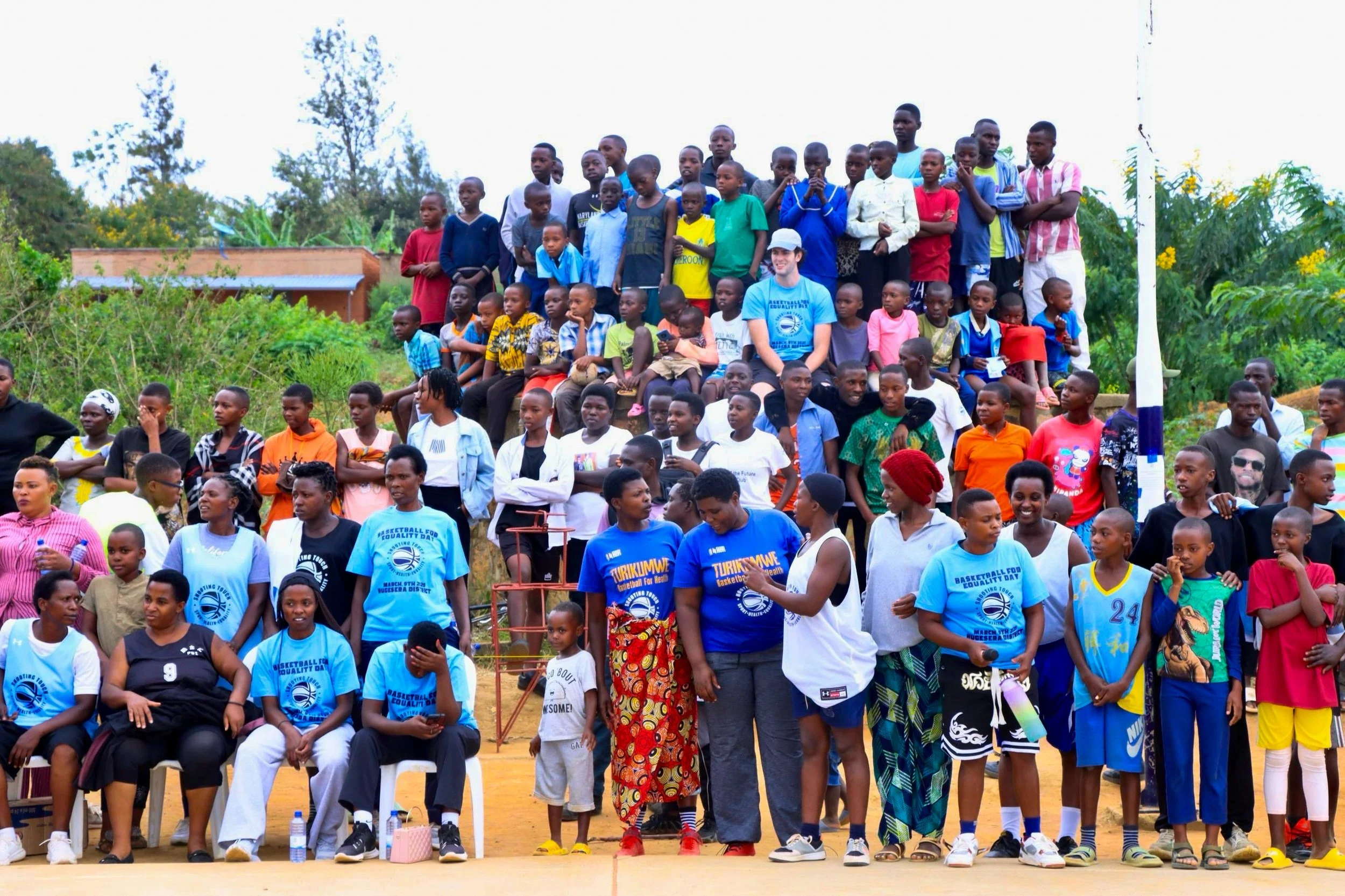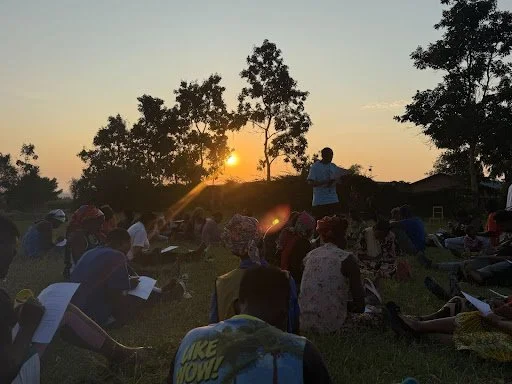After two months, I’ve begun to start fitting in out here.
My priority the last month or so has been attempting to begin creating a routine - learn how to get around, what/where to eat, and start getting familiar with Kinyarwanda, the language of Rwanda. To broker a ceasefire in the war between my stomach and the local cuisine, significant concessions were made—namely, the surrender of about 20 pounds and a solemn vow to avoid any roadside meat priced under 50 cents… unless it looks or smells really good, then all bets are off.
I have been on the road a TON, traveling from Kigali (the capital city) to Bugesera District (where Shooting Touch has 2 courts) to Kayonza District (Shooting Touch has 5 courts). From Kigali, it takes me about 4 hours to get to the village where I stay in Kayonza, and about 2 hours to get to my house in Bugesera. For those caught up on current events in Africa, the conflict occurring in the Democratic Republic of the Congo is taking place across the border from western Rwanda, on the complete opposite side of the country from where Shooting Touch operates, and does not affect my work or life in any way.
Map of Rwanda and the Regions I live in
This travel takes many forms, ranging from taxis to buses to motorcycles (motos) to bicycles, to my new personal favorite, the chicken coop tuck-tuck. The chicken coop tuk-tuk, as I call it, is a motorcycle inside of a tuk-tuk frame with a sidecar attachment - romanticized version of the moto with far more utility and opportunity for surface level conversation.
Kojo Taking the Chicken Coop Tuk-Tuk for a spin
It is common when getting any sort of taxi/moto/bike for the driver to name an absurdly high price and for a negotiation to break out. Unfortunately, as I have been more focused on Kinyarwanda words that help me make friends, my negotiation vocabulary is limited. I usually use the phrase, “amafaranga dyazi,” which means “I know the price,” although more times than not, I have no idea what the price is, nor do I know any numbers in Kinyarwanda. This leads to an exchange of sly facial expressions as the driver tries to call my bluff. Needless to say, negotiation is a work in progress.
A super cool realization for me is that the majority of the food I am eating is coming from the communities that I am living in. In Rwinkwavu, the village where I spend about half of my time, there is a community market every Saturday. Here, we’d go to stock up on rice, beans, potatoes, vegetables, and sometimes chicken. While there are butchers where you can buy chicken, it is incredibly fresh at the market. In fact, I’m not sure it is possible for it to be any fresher and sometimes you may even begin to build a sort of pet-like emotional connection with the chicken that you may or may not have named during the days you spend together, and that emotional connection sits in the back of your mind at night before you go to bed for a few days after the chicken has been … prepared. All of that to say, Ted the chicken is fresh, sustainable, and its purchase supports the community.
Sunset in Rwinkwavu, Kayonza
Kinyarwanda is not easy. Rwanda is the only country in the world where a significant portion of the population speaks Kinyarwanda, so the resources online are very limited. My strategy thus far is to talk to my Rwandan friends and get a few punchlines, which I write down on my phone. My favorite phrases are
Ni iki gisekeje - “What is so funny?” - This is a great one to use if someone is making fun of you, although it typically results in more jokes being made.
Twaba inshuti - “Can we be friends?” - I made the mistake of saying “Twaba ishati,” my first few times, which means “Will you be my shirt,” which I like to think could be some sort of endearing statement, yet judging by the responses I have received I don’t think it translates that way.
Ndishimye kukubona - “I am happy to see you.” - this one is my favorite greeting because it is not one that many non-Rwandans use, thus typically surprises folks.
Ukunda Kubzina - “Do you like to dance?” - Dancing is quite popular out here.
If you are attempting to try and pronounce these words at home, first try to sound them out as you would an English word. This will give you a reference of how not to pronounce them.
Sometimes I get lucky, and I can sneak through a 30-second conversation in which the person I am conversing with only says a handful of the 10 phrases I know and they think I actually know Kinyarwanda. However, most of the time neither me or the person I am talking to have any idea what is going on. The trickiest language error for me has been that “No” is translated to “Oya”, which is pronounced the same as “Oh Yeah” and I happen to say “Oh Yeah!” all the time at practice, which is super confusing for everyone.
My favorite conversations take place in the mornings before school starts in the village. As I walk anywhere, I typically am joined by between 1 and 30 elementary school kids in their uniforms on the way to school. The cool part about this conversation is that these elementary school kids are in the process of learning English and are at a slightly better English level than I am in Kinyarwanda. We both use our limited vocabulary and extensive dictionary of facial and hand expressions. Typically by the end of the 5-minute conversation, we have all gained a couple of new friends, solved a few of the world's problems, and set the world record for saying “How are you/Amakuru?” the most times in 5 minutes.
The kids here remind me so much of the kids I used to coach during camps at UNC. They are funny and mischievous – and they love to make fun of the big goofy white kid. Most of the time, I have no idea what they are saying, but from years of being inside of locker rooms and from having a younger* brother I’ve learned to recognize the type of laughter and body language that arises from a good roast.
*Note: I wrote “little brother” first, but I was reminded that I am in fact the little brother these days when I am around Oliver, especially with how I’ve slimmed out over here.
Some questionable style decisions
After presenting the mustache look, I was promptly asked “Are you ill?"
I’ve talked a little about Shooting Touch’s mission to use basketball as a tool to help address healthcare, gender, and other social issues, yet have talked little about what this actually looks like. Shooting Touch has 7 courts in Rwanda’s Eastern Province and every day, you will find no-cost, high-quality basketball practices led by an incredibly talented, fully-Rwandan coaching staff. The adult women begin at 4:00 p.m., the Imishwe (“little chickens” a.k.a. U13 boys and girls) practice at 5:00 p.m., and the U18 boys start at 6:00pm. The U18 Girls either practice at 5:00 or 6:00, depending on how dark it is.
It is common to see 100+ participants in each age group, every single day. Each quarter throughout the year, there is a new joint basketball/health curriculum assigned to the coaches to implement into their weekly practice plan. While building basketball courts is the exciting development project that most people want to be a part of, it is the daily sport-for-health programming that makes the biggest impact.
Coach Nico holding the women’s Kitenge during a Shooting Touch practice. Kitenge is the term for traditional, colorful fabric used to make dresses, skirts, etc. in Rwanda. Kitenge is a huge part of the Rwandan culture, as well as the expected choice of clothing for women to wear in public. Shooting Touch women will commonly wear wrapped kitenge dresses on the way to practice and then take them off, revealing a pair of basketball shorts and an athletic t-shirt underneath.
My days vary tremendously depending on what is going on. My job is to support the coaches in anything related to basketball, which ranges from working with the coaches on developmental basketball strategies, to attending practice and increasing engagement among program participants.
Coach Isaie proctoring a health survey to beneficiaries in Mayange, Bugesera District - You can always count on a nice sunset during practice
During our orientation, the phrase “decentering oneself” was a recurring topic. Decentering, for me, is making the work I am doing here not about me, but about the folks we are serving. At first, this felt super obvious - I thought, “Of course I'm not here to make this about myself.” Yet, after some great conversations with Chloe (Director of International Programming and Strategy) and Sam (Director of Communications), as well as some personal reflection, I realized this process was a little bit trickier than I first realized.
Upon arrival in Rwanda, I found myself viewing the country through the lens of my experience in America, constantly trying to make sense of what I was seeing based on what I knew back home. In the context of my job, this took the form of observing Shooting Touch, comparing what I know or have seen, and coming up with my own solutions to problems I thought I saw.
Yet, I began to realize that I am viewing everything through my own lens, and that I have only a very basic understanding of the social, economic, and community dynamics in Rwanda. Through “making sense” or creating an explanation for the way things are, I am only creating a box to fit everything in based on what I know.
A big part of attempting to understand the country and decenter myself has been acknowledging that I know very little about the way people live, think, and interact here, so it is futile to try to “make sense” of anything. Rather, my goal is to just live, interact, make some new shirts (and friends), and just take it all in. The beauty of this Fellowship is that Shooting Touch places you directly within the communities we serve, while setting you up with a support system, so there is no better place to learn.
I am looking forward to learning more.









